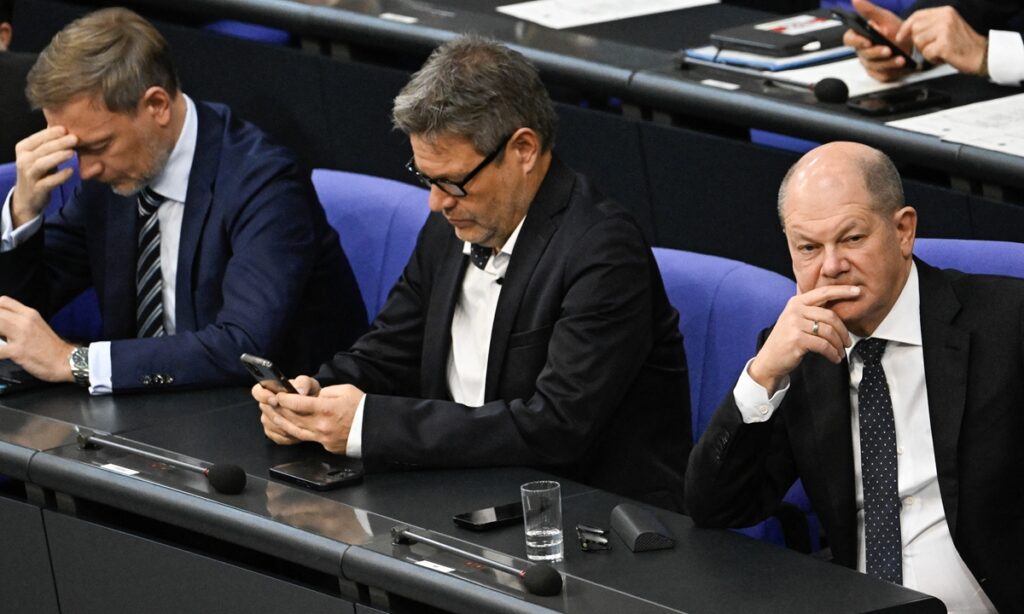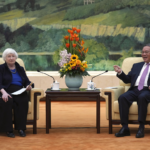Germany’s top corporate brass to join the trip: media report
German Chancellor Olaf Scholz is scheduled to travel to China in mid-April, accompanied by three federal ministers and a business delegation, media reported. Chinese analysts said Scholz aims to strike a balance in Germany’s China policy, ensuring it is not swayed by the hard-line rhetoric of politicians advocating “de-risking.”
The German Chancellor’s visit is part of a broader series of high-level engagements between China and the EU, and may help foster positive momentum toward consensus-building, the analysts noted.
Scholz reportedly will travel to China for a two-day trip from April 15 to 16. German newspaper Handelsblatt said in a report on April 4 that Scholz will be accompanied by Environment Minister Steffi Lemke, Agriculture Minister Cem Özdemir and Transport Minister Volker Wissing. It noted that “it is unusual” for a Chancellor to be accompanied by several federal ministers on a trip to China and would “otherwise only [take] place as part of government consultations.”
Reuters reported on the same day that Germany’s top corporate brass, including Roland Busch, chief executive of Siemens, Mercedes-Benz CEO Ola Kaellenius and lab equipment and semiconductor chemicals maker Merck KGaA’s CEO Belen Garijo will join Scholz when he visits China. Busch also serves as chair and president of the Asia-Pacific Committee of German Business.
The Chinese side hasn’t yet released information on Scholz’s visit as of press time on Sunday.
Scholz’s upcoming visit to China signifies Germany’s willingness to maintain pragmatic cooperation with China. The visit is part of a series of exchanges and communications between China and Germany that have been ongoing since 2022, He Zhigao, a research fellow with the Institute of European Studies from Chinese Academy of Social Sciences, told the Global Times on Sunday.
Scholz was last in China in November 2022. Chinese President Xi Jinping met Scholz in Beijing and the two leaders agreed on enhancing cooperation, maintaining dialogue, and rejecting decoupling and bloc confrontation.
In June 2023, Chinese Premier Li Qiang visited Germany and co-chaired the seventh China-Germany inter-governmental consultation with Scholz.
Sustaining these high-level engagements is crucial in preventing strategic misunderstandings between China and Germany, especially in light of the unveiling of a new strategy by Scholz’s three-party coalition in July 2023 that claimed to de-risk Germany’s economic relations with China. This strategy, borne out of complex negotiations and compromise among the coalition partners, has sent mixed signals regarding Germany’s policy towards China, He said.
Despite calls from some people to decouple from China, Scholz and the majority of the business community remain committed to rejecting “decoupling” rhetoric and instead seek to deepen cooperation, some experts said. Senior German officials’ visits to China typically involve high-level business delegations. Scholz’s visit, which includes top corporate figures from Germany, underscores the close economic ties between the two countries, analysts said.
On Saturday, China’s Ministry of Commerce convened an “invest in China”-themed roundtable meeting in Munich. Representatives of German companies and business groups, including the Chamber of Commerce and Industry for Munich and Upper Bavaria, as well as executives from six large enterprises including BMW and Siemens attended the meeting.
Scholz’s visit to China underscores Germany’s commitment to preserving the mutual benefits derived from bilateral cooperation. Beyond the automotive industry, there is significant untapped potential for collaboration in sectors such as new energy and biopharmaceuticals, Cui Hongjian, a professor with the Academy of Regional and Global Governance with Beijing Foreign Studies University, told the Global Times on Sunday.
According to Handelsblatt, During Scholz’s visit to China, the German government seeks room for cooperation, particularly in the areas of climate and the environment, and in transport policy.
Scholz will also endeavor to seek a political balance in Germany’s China policy, preventing it from being kidnapped entirely by negative voices or policies emanating from its foreign ministry and economic ministry, Cui said.
For instance, Germany’s Foreign Minister Annalena Baerbock of Green party, who advocates a tough stance on China, has drawn criticism from some Chinese observers for potentially undermining bilateral relations. Similarly, Economy Minister Robert Habeck, also from the Greens, has warned against over-reliance on China.
Concerns raised by some politicians regarding China’s alleged overcapacity, unfair competition practices and perceived risks are causing apprehension among small- and medium-sized companies in Germany. If such rhetoric persists, it could potentially harm bilateral relations between China and Germany, said the expert.
While analysts call more efforts within Germany as well as in the EU to push forward pragmatic cooperation despite disputes and negative influences from other countries, they admit that these relations are undergoing a transition to a “new normal” with both sides making adjustments.
The dynamics of China-EU relations have shifted due to evolving geopolitical realities, prompting a restructuring phase. While the EU perceives China as an uncertain factor in terms of security and economic matters, it remains committed to pursuing cooperation and dialogue with China in its own interests, Cui said.
While both positive and negative factors for the China-EU relationship co-exist, Scholz’s visit, together with a series of high-level engagements between China and the EU, will play a positive role in pushing the two sides to seek consensus, he said.
(Global Times)




